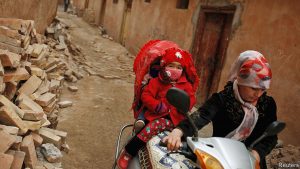Shelby Parker planned to get pregnant this year. The timing seemed right: She was working as a middle school teacher in Cuyahoga Falls, Ohio, a job that provided benefits for her whole family. Her husband, who drives a truck for FedEx, had just gotten a promotion. Their 21-month-old daughter was nearly ready for preschool.
Now Parker, who is 29, is contemplating not trying for a second child at all. The state, deprived of tax revenues because of business closures resulting from the coronavirus, slashed its budget and cut public-school funding by $300 million. The school has warned teachers that there may be a round of layoffs before the end of the year. As the pandemic rages on, she and her husband worry that she could end up out of work. If that happens, they’ll be left without health insurance.
If things were different—if Parker had confidence in the economy, in her chances of staying virus-free on the days she teaches in person, and in the ability of the nation and Ohio to control the spread of the coronavirus—she’d be pregnant already. “I’m grieving for the family I thought I would have,” she says.
Economists and fertility experts say hundreds of thousands of American women are making the same decision. A June report from the Brookings Institution estimated that the U.S. would see as many as 500,000 fewer births in 2021, a 13% drop from the 3.8 million babies born in 2019. Telehealth clinic Nurx tells TIME it has seen a 50% jump in requests for birth control since the beginning of the pandemic, and a 40% increase in requests for Plan B. A surveyfrom the Guttmacher Institute found that 34% of sexually active women in the U.S. have decided to either delay getting pregnant or have fewer children because of concerns arising from COVID-19. Lower-income women were much more likely than other women to want to put off having a baby; that’s especially true among Black and Latinx women, who have suffered disproportionate income and job losses this year.
On top of financial worries, the pandemic has plagued would-be mothers with a host of other concerns, including hospital rules that might banish partners from the delivery room and the risk of exposing relatives to illness if they’re needed to provide childcare. And of course, parents are worried about the health of the baby: Los Angeles County recently reported the first newborn cases in the U.S., with 8 of 193 babies testing positive for COVID-19. Katie Hartman, 34, lives in Florida, one of the states hardest hit by the coronavirus, and is considering a home birth if she does decide to get pregnant. “You never know when another spike will come, and it just seems wise to avoid the hospital,” she says.
The long-term impact of such delays could be staggering. The U.S. fertility rate is the lowest it has been since 1985. We’re also a relatively elderly nation; by 2034, Americans over age 65 are expected to outnumber those under 18 for the first time in U.S. history. Already, the country faces a severe dearth of workers able to drive the economy and care for our aging population.
Demographers and women’s-rights advocates alike say the looming baby bust is a damning indictment of the health care and childcare systems in the U.S. America is the only developed country that does not guarantee paid leave to new parents, and it does not offer universal childcare or universal pre-K. “COVID set off a bomb in the middle of these jerry-rigged ways of getting by in this country that individual families had created,” says Emily Martin of the National Women’s Law Center. “It’s no wonder parents don’t want to deal with having a newborn right now.”
A July survey from the Mom Project, a startup that works to pair mothers who have dropped out of the workforce with new jobs, found that U.S. moms are twice as likely as dads to leave their jobs in 2020 because of the strains of juggling work and family care since the pandemic began, and the Bureau of Labor Statistics found that four times more women than men dropped out of the workforce in September alone. Studies show that women who leave the workplace, even for just a year, suffer financial consequences for the rest of their lives.
Now, after decades of fighting for equal pay and equal opportunities in the workplace, women are once again left with a choice: Have a career or have a baby?
“With everything being so iffy and businesses closing and layoffs, would I have a job to go back to?”
Margaret Ogden, a 33-year-old lawyer in Richmond, Va., had been waiting until her husband, a doctor, finished residency before trying to get pregnant. She figured she could lean on her mother for childcare help. Now that her husband is working in a hospital where he might be exposed to the coronavirus, her plan is on hold. Asking her mother to stay with them to babysit is out of the question, and Ogden, who is working primarily from home, knows she’d likely be left to juggle childcare and work largely on her own. “As a lawyer you can’t really work part time, and full time is a lot more hours than some other professions,” she says. “I have friends who are honest and vulnerable about what’s happening right now, and they feel like they’re not being good parents or good employees.” Even before the coronavirus placed new burdens on moms, she saw high-powered female lawyers forced to take on less ambitious work when they had children. The ones who stayed displayed grit and resolve that seemed possible but difficult to emulate.
“Choices for working couples were never great to begin with,” she says. “They’re impossible now.”
The situation is worse for would-be parents who don’t have the option of working from home. Aaron Whitaker, 33, has an endometriosis diagnosis that could make getting pregnant difficult, so she and her husband Marty discussed starting their family soon. But Whitaker, who works in human resources in Detroit, and her husband, who works at Chrysler, were told they must come in to work despite the pandemic.
Even if she felt comfortable going to an office while pregnant during a pandemic, Whitaker had to wonder how the family would manage after the baby was born. Taking vacation days to care for an infant would be financially risky. “With everything being so iffy and businesses closing and layoffs, would I have a job to go back to?” Whitaker asks.
And then there’s the issue of accessible childcare. The childcare industry has been slammed by the pandemic, according to a July survey from the National Association for the Education of Young Children. It predicted that without substantial government investment, 40% of childcare programs surveyed would be forced to close because of low enrollment and higher operating costs. “We decided we’re probably not going to have a kid until coronavirus is gone gone,” says Whitaker. “And that might be a few years. And that’s O.K.”
But demographers say that if women delay having babies at any point in their lives, it’s more likely that they won’t have babies at all or won’t have as many as they originally planned. “Women see a major crunch because they have to complete their education, get their careers started, find a partner and have babies—if they plan to do that—in just a 10-year span,” says Dowell Myers, the director of the Population Dynamics Research Group at the University of Southern California. Even as advances in health care and technology have allowed women to delay pregnancy, women are having fewer babies total than their mothers and grandmothers did.
Millennials, the 24- to 39-year-olds who are most likely to consider having a child right now, already had their life plans delayed because of the Great Recession. They’re achieving career milestones later, buying houses later and having kids later than previous generations. Myers says that if hundreds of thousands of millennial women choose to delay pregnancy even longer—until the arrival of a vaccine, a downturn in cases in their area or a return to “normalcy”—then “we’re looking at a fundamental and unprecedented change to our population.”
Many women are asking existential questions about whether they should bring a child into such a scary world. Haley Neidich, a 35-year-old therapist in South Pasadena, Fla., has decided not to get pregnant until “the pandemic is over,” but she’s still trying to figure out what “over” means. Her previous two pregnancies—one of which ended in miscarriage shortly before she began to quarantine—were tough. She experienced debilitating nausea that, if she were to get pregnant again, would make it hard to care for the toddler she already has. She has nightmares about the possibility of another miscarriage and being forced to go to the doctor alone for a heartbreaking surgery if that came to pass.
But with no end date for the spread of COVID-19 in sight, that may be a risk she has to take. “I still believe in a world where I go to brunch and get to take pictures of my pregnant belly with my friends,” she says. “But maybe for women 35 and older, that’s unrealistic. That’s not going to be the reality of pregnancy in the near future, and maybe I need to adjust my expectations for what pregnancy is.”




